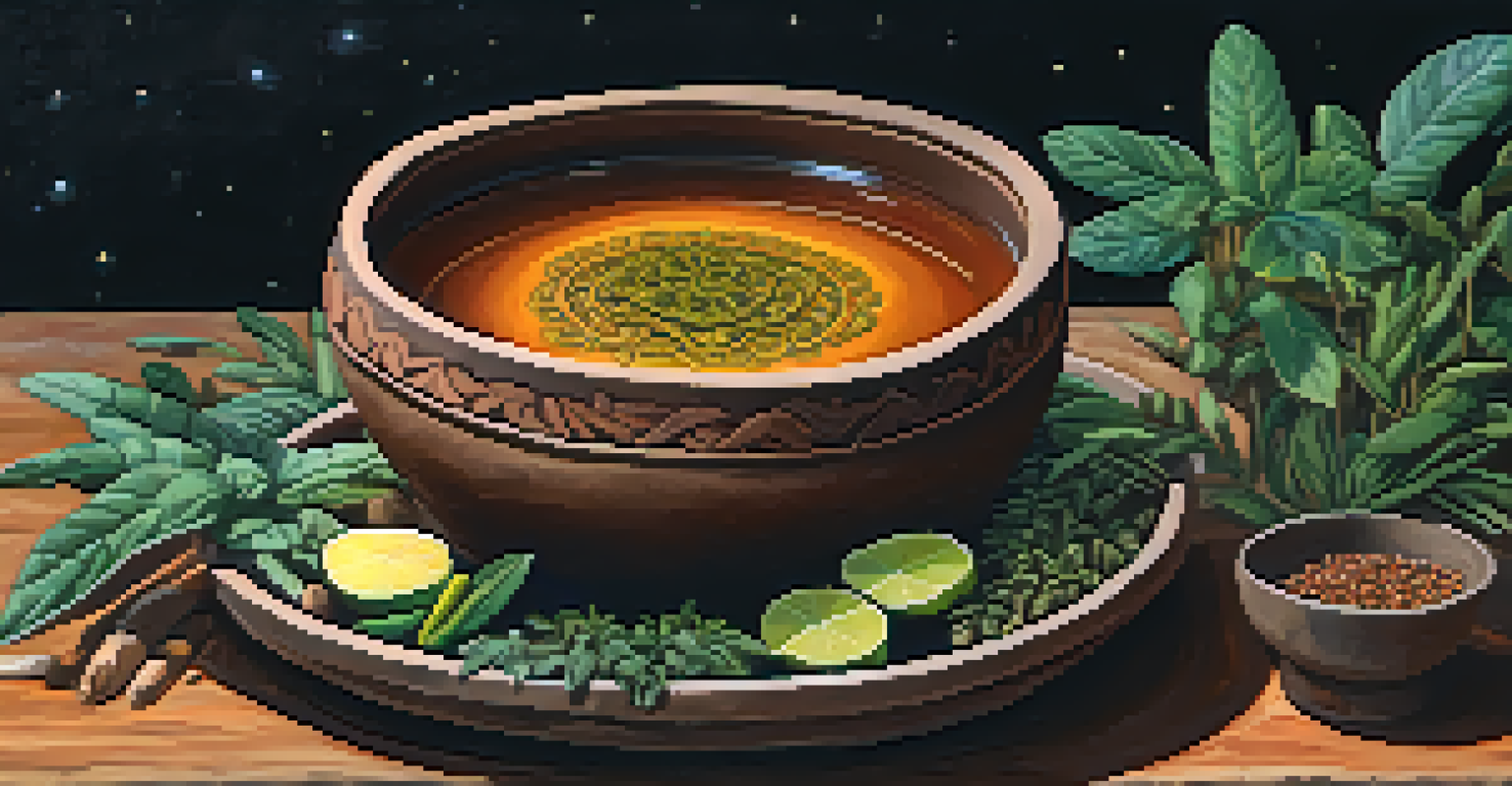Navigating the Ethical Landscape of Ayahuasca Retreats

Understanding Ayahuasca: A Brief Overview
Ayahuasca is a traditional Amazonian brew known for its psychoactive properties. Often consumed during ceremonial rituals, it has gained popularity worldwide for its potential to provide deep spiritual insights and therapeutic benefits. While many seek out Ayahuasca for personal growth, understanding its cultural significance is crucial for respectful engagement.
Ayahuasca is not just a plant medicine; it’s a bridge to the sacred and a path to understanding the self and the universe.
The brew typically combines two plants: the Banisteriopsis caapi vine and the leaves of the Psychotria viridis shrub. This combination creates a powerful hallucinogenic experience that can last several hours. However, the allure of Ayahuasca goes beyond its psychoactive effects; it is deeply rooted in indigenous traditions and healing practices.
As interest in Ayahuasca grows, so too do concerns about its commercialization and the ethical implications for both participants and indigenous communities. Navigating this landscape requires sensitivity and awareness of the potential impacts of participation in these retreats.
The Rise of Ayahuasca Retreats: A Cultural Shift
In recent years, Ayahuasca retreats have surged in popularity, attracting seekers from all over the globe. This trend reflects a broader cultural shift towards alternative therapies and spiritual exploration. However, this rise also raises questions about the authenticity and integrity of these experiences.

Many retreats are marketed as transformative experiences, often catering to tourists who may not fully understand the cultural context of Ayahuasca. This commercialization can dilute the traditional practices and values upheld by indigenous cultures, leading to ethical dilemmas regarding cultural appropriation and exploitation.
Cultural Significance of Ayahuasca
Understanding Ayahuasca's roots in indigenous traditions is essential for respectful participation in retreats.
As individuals seek to explore their consciousness, it’s essential to consider the implications of participating in such retreats. Engaging with these experiences respectfully and mindfully is crucial to ensuring that the practices are honored and sustained.
Awareness of Cultural Appropriation in Ayahuasca Use
Cultural appropriation is a pressing concern in the context of Ayahuasca retreats. It occurs when elements of a culture, often marginalized, are adopted by those outside of it, usually without understanding or respect. This can be particularly problematic when it comes to sacred rituals and practices.
Cultural appropriation is the theft of cultural elements, and the commodification of sacred practices can lead to a loss of meaning for those who have held them for generations.
Many indigenous communities have long used Ayahuasca for healing and spiritual connection, and commodifying these experiences can undermine their significance. Participants must recognize that they are stepping into a deeply rooted tradition and not just a recreational experience.
Being aware of cultural appropriation means taking the time to educate oneself about the origins of Ayahuasca and honoring the communities that have preserved these practices for generations. This awareness fosters a respectful relationship between participants and indigenous cultures.
The Role of Indigenous Guides in Ayahuasca Retreats
Indigenous guides play a vital role in Ayahuasca ceremonies, offering wisdom and knowledge that comes from years of tradition. Their presence can help ensure that the experience remains authentic and respectful of cultural practices. However, not all retreats employ genuine indigenous facilitators, leading to concerns about integrity.
When choosing a retreat, it’s important to research the background of the facilitators. Are they truly connected to the tradition, or are they merely marketing themselves as such? Engaging with qualified and experienced guides can enhance the safety and authenticity of the experience.
Ethical Engagement in Retreats
Participants must navigate the complexities of cultural appropriation and ensure their motivations align with genuine respect for the practice.
Having a knowledgeable guide not only adds depth to the ceremonial experience but also fosters a connection to the cultural roots of Ayahuasca. Respecting the role of these guides is essential in navigating the ethical landscape of Ayahuasca retreats.
Ethical Considerations for Participants
As participants, it's essential to approach Ayahuasca retreats with a mindset of responsibility and respect. This includes understanding the potential psychological impacts of the experience and being prepared for the emotional work it may entail. Acknowledging that Ayahuasca is not a 'quick fix' can help set realistic expectations.
Participants should also consider their motivations for attending a retreat. Are they seeking genuine healing or simply a fascinating experience? Reflecting on one’s intentions can guide a more meaningful engagement with the Ayahuasca journey.
In addition, creating a supportive environment for sharing experiences and integrating insights afterward is crucial. This collective approach fosters a community of understanding and respect, enhancing the overall journey.
Legal and Safety Issues Surrounding Ayahuasca Retreats
The legal status of Ayahuasca varies widely across countries, which can complicate participation in retreats. In some places, it is recognized as a traditional medicine, while in others, it remains illegal. It's imperative for participants to understand the legal implications of attending a retreat in their chosen location.
Safety is another critical aspect to consider. The combination of Ayahuasca’s potent effects and the emotional depth it can evoke may pose risks, especially for those with certain medical conditions or mental health concerns. Participants should always disclose their health histories to facilitators to ensure a safe environment.
Importance of Integration After Retreats
Proper integration of experiences gained during Ayahuasca ceremonies is crucial for personal growth and making sense of insights.
Choosing a reputable retreat that prioritizes participant safety and well-being can mitigate these risks. This includes providing pre-ceremony assessments and aftercare support to help participants navigate their experiences.
The Importance of Integration After the Experience
Integration is a crucial phase that often follows an Ayahuasca retreat, allowing participants to process their experiences and insights. Without proper integration, the profound revelations gained during the ceremony can fade or lead to confusion. This step is essential for translating insights into everyday life.
Many retreats offer integration support, such as group discussions or one-on-one sessions with guides. Engaging in these practices can help participants unpack their experiences, making sense of the lessons learned and how to apply them moving forward.

Integrating the experience also fosters a sense of community among participants, encouraging ongoing support and connection. This shared journey can enhance the overall impact of the Ayahuasca experience, allowing for personal growth and transformation.